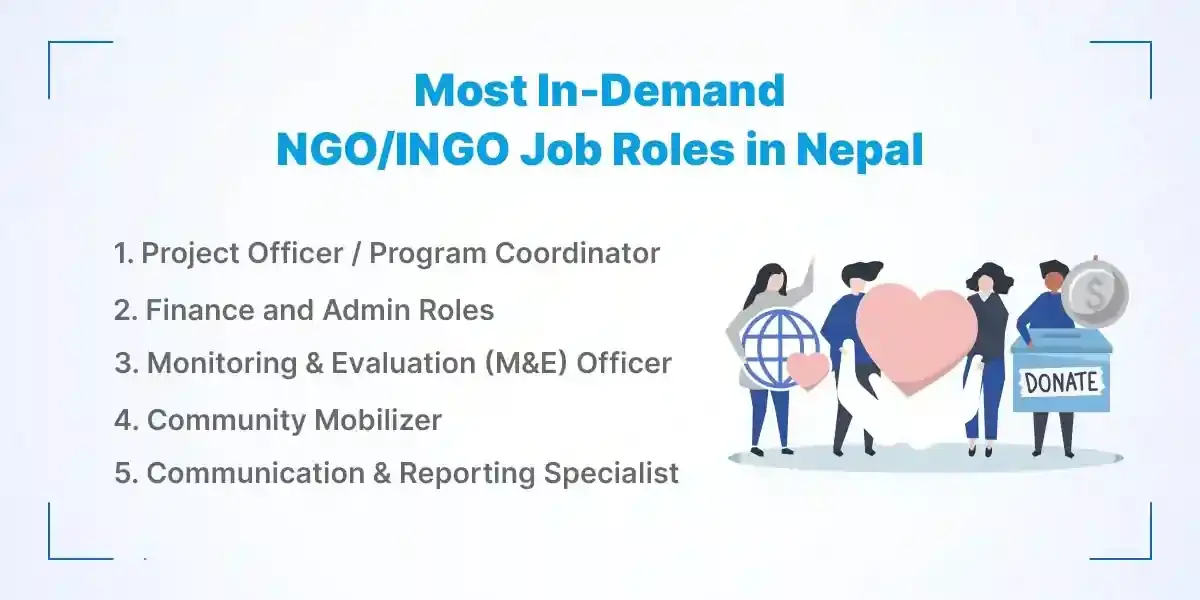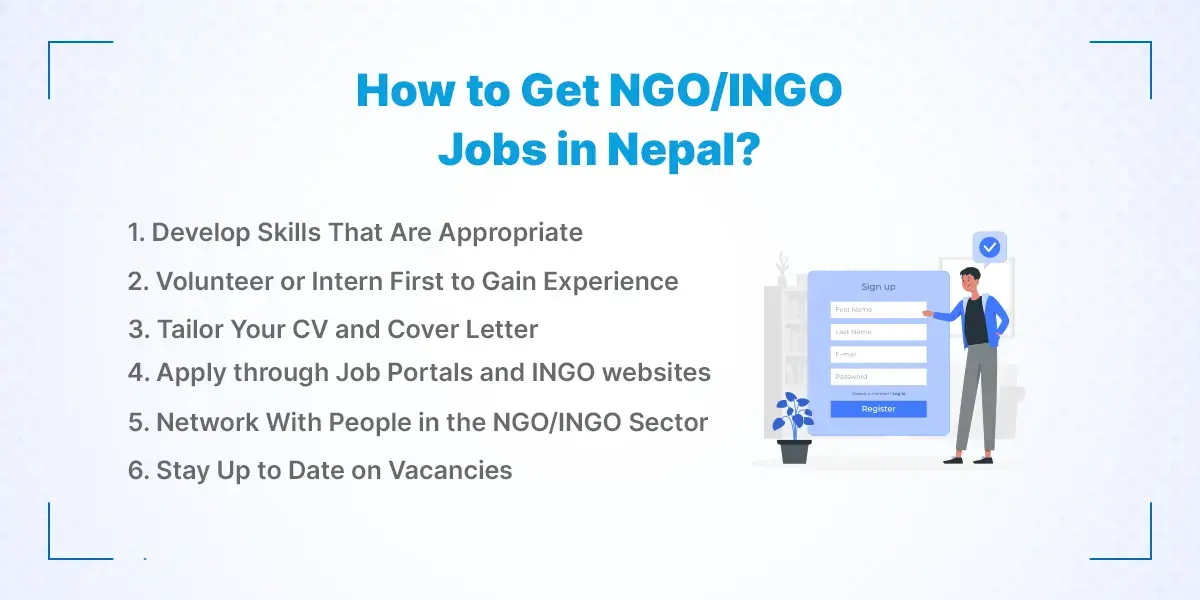
Are you looking to build a rewarding career and make a real impact in the lives of people? If so, NGO and INGO jobs in Nepal can be just what you are looking for. From helping people affected by disasters to improving education and healthcare, they offer valuable work and good career options. Recently, there has been a growing demand for educated workers in non-government jobs. Organizations like the UN, Save the Children, and the Red Cross are hiring in Nepal, providing great chances for both new and experienced workers.
In this blog, we will help you learn all about NGO/INGO jobs in Nepal. Whether you are new to the job market or want to change jobs, this guide is easy to understand, so you can confidently take your next step.
In this blog
What are NGO and INGO Jobs, and why are they so Popular?
NGO stands for Non-Governmental Organization, and INGO stands for International Non-Governmental Organization. Both organizations work on socially critical issues like education, healthcare, disaster relief, human rights, and removing poverty. NGO/INGO careers involve work that benefits these ends—fieldwork, project management, training, research, finance, communications, etc.
These are some of the highest-paying professions in Nepal, as they provide meaningful work and opportunities for both professional and personal growth. Many individuals prefer to work for organizations that genuinely improve people's lives. INGOs are particularly known for offering better salaries, benefits, and international exposure compared to most government or private sector jobs. For both fresh graduates and experienced professionals, a career in NGOs or INGOs is viewed as a rewarding and secure option.
Who Can Apply for NGO/INGO Jobs in Nepal?
Anybody who is qualified, experienced, and eager to work can apply for NGO/INGO jobs in Nepal. Most organizations hire candidates with qualifications in social work, education, health, development studies, or business. Both fresher and experienced candidates can find jobs based on their level, ranging from basic positions to technical and managerial roles.
1. Educational Requirements
A minimum of a bachelor's degree is necessary for any NGO/INGO job. You can study subjects like social sciences, public health, development studies, education, business, and environmental science. To land a job in senior roles, a master's degree would be preferred. However, some jobs like social mobilizers or volunteers may only require a +2 or a diploma certificate. But don't worry. Work experience and skills also count if you don't have a formal degree. Before applying, check the job vacancy requirements to see what education is required.
2. Language and Communication Skills
Candidates must have effective communication skills to get a job in the NGO/INGO sector. You should have fluency in both written and spoken Nepali and English. English is important for tasks like report writing, proposals, and while working with international teams. If you are looking for a job with an INGO, English proficiency is a must. Effective communication is required while you work with local communities, stakeholders, and donors. Employers generally prefer candidates with public speaking and presentation skills.
3. Important Soft Skills
Along with the technical skills, some soft skills are equally important. Firstly, teamwork is necessary as you will be working together with colleagues from other departments regularly. Problem-solving skill allows you to handle any issues in the field. As NGOs work with different communities, you also need to be culturally sensitive. These soft skills can set you apart even if you're a new graduate.
Most In-Demand NGO/INGO Job Roles in Nepal
NGOs and INGOs in Nepal hire candidates for various roles. Some of them are common roles while some are important than others. They help in planning, management, and the execution of different projects.
Let's see some NGO/INGO job roles that are in most demand:

1. Project Officer / Program Coordinator
Project Officers or Program Coordinators are the senior-level roles who plan and manage different projects. They plan the work, monitor progress, and make sure the targets are met on time. They also deal with field staff, local stakeholders, and donors. You must have good communication and time management skills to land a job in this role. They are also responsible for writing reports and keeping records of project results. A bachelor's or master's degree in social work, development studies, or a relevant field is most commonly required.
2. Finance and Admin Roles
Finance and admin staff handle budgeting, accounting, and the company's general office work. They make payments, keep financial records, and keep track of rule compliance. Admin staff also help with HR activities like maintaining employee records and organizing training or events. These roles need attention to detail and fundamental computer knowledge. A bachelor's degree in accounting, management, or business is typically needed. Familiarity with finance software is preferred.
3. Monitoring & Evaluation (M&E) Officer
M&E Officers track the progress of projects and help in measuring the results. They collect data, write reports, and verify whether the project objectives are being met. Their work helps NGOs know what is good and can be improved. Data analysis, field work, and making clear reports are necessary for this job. If you have an educational background in statistics, public health, or development studies, you would be perfect for this role.
4. Community Mobilizer
Community Mobilizers are the individuals who directly interact with the people of the place where the project is ongoing. They help with awareness, offer training, and encourage local involvement in the project. This is a very critical position in building trust between the community and the NGO. Mobilizers must be good speakers and listeners as they often need to travel to rural areas. For this job, employers often look for +2 graduates. However, skills matter more. People from the local area are often preferred for this role.
5. Communication & Reporting Specialist
This role requires writing reports, success stories, and other written materials. They also help maintain the organization's social media, website, and press releases. The aim is to effectively communicate project updates to donors, partners, and the general public. Proper English writing and editing skills are important here. A degree in communication, journalism, or English is desirable.
How to Get NGO/INGO Jobs in Nepal?
To get an NGO or INGO job in Nepal, you need to have the right mix of skills, experience, and contacts. Organizations recruit people who are passionate about social work and possess the skills to manage projects, write reports, or interact with communities directly. Even if you are a fresh graduate, volunteering or internships can be useful to land full-time jobs in the future.
Below is a step-by-step guide on how you can get NGO/INGO jobs in Nepal:

1. Develop Skills That Are Appropriate
Start by gaining skills that NGOs and INGOs often ask for. Some of these include project management, proposal writing, monitoring and evaluation (M&E), and computer skills. You can access free or paid courses online or locally. The more skills you have, the better your chances.
2. Volunteer or Intern First to Gain Experience
If you are not experienced yet, start with volunteering or internships. Most Nepalese NGOs have entry-level jobs where you can learn as you work. This makes your future employers realize you are serious and willing to learn. Even some months of experience will earn you attention. It also teaches you about how NGOs work from the inside.
3. Tailor Your CV and Cover Letter
Don't send the same CV to all applications. Customize your resume and cover letter to fit the employer and job. Highlight skills and experience that are appropriate for NGO/INGO work, like teamwork, communication, or field visits. Use simple, not overly complicated language. A great cover letter can sometimes be the deciding factor.
4. Apply through Job Portals and INGO websites
Search for jobs on credible Nepali job portals like Kumari Job. You may also look at the websites of INGOs like the UN, World Vision, or Save the Children for direct employment. Always follow the instructions in the vacancy notice. Ensure that your documents are completed and submitted within the specified timeframe.
5. Network With People in the NGO/INGO Sector
Most of the job vacancies are filled through recommendations. So, talk to people who are already employed in the field. Go out for events, seminars, or online conferences where NGO professionals gather. Networking can help you learn about openings ahead of time and gain valuable advice. A recommendation from someone within can seriously boost your chances.
6. Stay Up to Date on Vacancies
If you are looking for a job, it should be a routine to look for new job vacancies on a daily basis. Like job portals, NGO pages on Facebook, and LinkedIn. Subscribe to email notifications on job websites to stay informed and avoid missing out. The sooner you apply, the greater your chance. Being proactive and updated keeps you quick to respond to the right opportunity.
Looking for NGO/INGO Jobs in Nepal?
Discover the latest opportunities in top NGOs and INGOs across Nepal. Build your career in social impact today.
What is the Salary of NGO/INGO Jobs in Nepal?
The salaries of NGO and INGO jobs in Nepal vary from NPR 30,000 to NPR 400,000 per month, depending on skills, experience, and organization size. Entry-level positions like Program Assistants or Officers start at around NPR 30,000–60,000 per month, while senior-level positions like Project Managers or Technical Advisors receive NPR 150,000–300,000 or more.
1. Salary Ranges for Different Levels (Entry to Senior)
- Entry level: Normally NPR 30,000–60,000/month, with NGOs sometimes offering basic support roles at NPR 25,000–30,000.
- Mid-level: Usually earn NPR 70,000–180,000/month, depending on technical responsibility and funding.
- Senior level: Salaries range from NPR 150,000 to over 400,000/month, especially in big INGOs with international donor funding.
2. Allowances, Insurance, and International Perks
The majority of NGOs and INGOs offer allowances like travel or field visits, medical and accident insurance, and festival bonuses. Staff may be given capacity-development training or even international exposure in the case of larger INGOs. These benefits can add significantly to your overall salary package and increase job satisfaction.
3. NGO/INGO vs. Government/Private Sector Pay
INGO salaries are higher than government and private sector salaries for the same job. For example, a Program Officer in an INGO can earn NPR 200,000+/month, while similar jobs in the government or private sector usually pay less. And although government jobs often include bhatta (allowances), even these may total up to less than INGO salaries.
Where to Find the Latest NGO/INGO Job Vacancies in Nepal?
You can find the latest NGO/INGO jobs in Nepal in the job portals like Kumari Job, NGOs' official sites, and professional networking sites. You can also find good opportunities by attending career fairs and events in the development sector. Let’s see some of the places where you can find your dream job:
1. Online Job Portals
Job portals are one of the easiest sources for finding current NGO job postings. Websites like Kumari post local and international NGOs' vacancies regularly. You can filter jobs based on location, level, city, or experience. Set job alerts so you get new jobs in your email. They also allow you to apply with convenience by uploading your CV and cover letter.
2. NGO/INGO Official Websites and LinkedIn
Most large NGOs and INGOs only post job openings on their official websites or LinkedIn pages. Regularly check sites such as UN Nepal, World Vision, Save the Children, and other large organizations. Following their LinkedIn pages may allow you to gain information regarding vacancies, events, and tips. Some INGOs might also shortlist or directly contact candidates via LinkedIn. Keep your LinkedIn page professional and complete.
3. Attend Career Fairs and Development Conferences
Career fairs, seminars, and development conferences are great opportunities to meet NGO recruiters in person. These conferences generally have booths, presentations, and network sessions where you can sit with them and have your questions answered, along with handing over your CV.
You can also learn more about the types of job positions available and what different organizations look for. Although you may not be interviewing right away, these events help in building good contacts.
Career Growth and Future Scope in the NGO/INGO Sector
Employment in INGOs or NGOs allows you to make a real difference and create a stable, rewarding career. Most individuals start in entry-level positions and make their way up to leadership positions over the years. With the right skills and hard work, you can shift from local roles to international roles.
1. Career Path in the Development Sector
Most people start their careers as field assistants, community mobilizers, or project officers. They can transition to program coordinators, M&E officers, or team leaders after a few years. From there, they can target higher positions such as project manager, technical advisor, or country director. Your professional development in this sector is based on your performance and abilities. Both education and on-the-job experience are significant.
2. Local to International Transitions
As you gain more experience and competence, you can work on international projects or move to other countries. INGOs will provide their own staff members with a chance to work in international jobs. If you have experience working with large projects or international teams, it is easier to apply for international or regional roles. Good English, leadership, and documentation abilities make this transition easier. A number of Nepali professionals have managed to move from local NGOs to regional offices in Asia or even headquarters abroad.
3. Recommended Certifications (PMP, SPSS, etc.)
Certifications have the potential to set you apart in such a competitive market. Effective ones include PMP (Project Management Professional) for project managers, SPSS or Excel for M&E roles, and proposal writing or grant management training for fundraising roles. These clearly show that you are career-committed and give your CV an edge. You can access these courses on the web or at training institutes in Nepal. Even very short certifications can have value in applying for promotions or new jobs.
Conclusion
NGO and INGO jobs in Nepal are a good way to build a stable career while helping others. Whether you are just starting your career or want to move up in your job, this field is open to people who are passionate, skilled, and dedicated. With good pay, chances for promotion, and the opportunity to help real social causes, many Nepalis are choosing this path. If you want to make a difference and have a successful life, working in the NGO/INGO sector in Nepal could be a great choice for you. Start today. Your future begins with your first step.
Looking for more stable and high-paying career options? Explore the latest openings in the banking sector across Nepal.











Loading Comments...